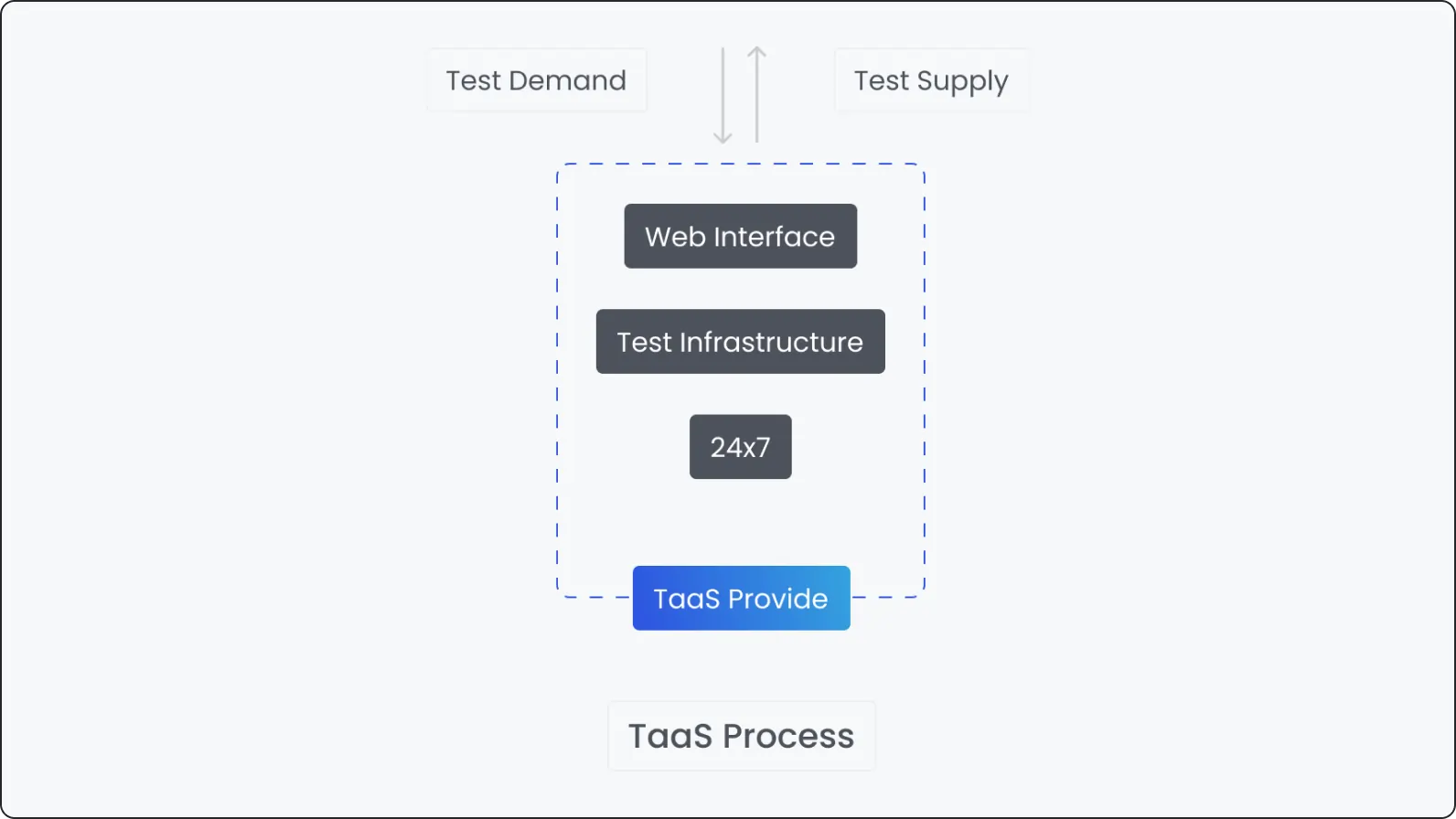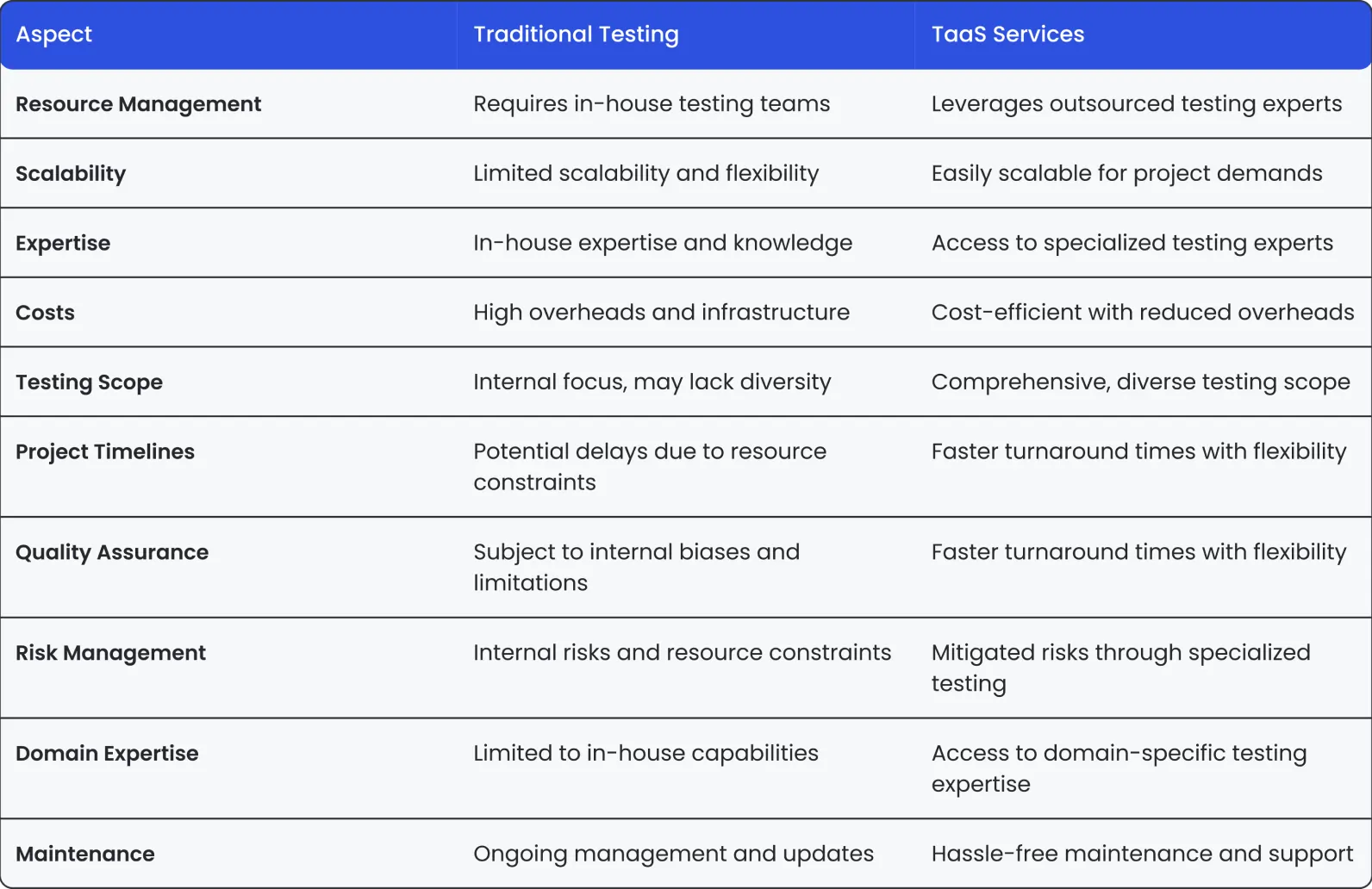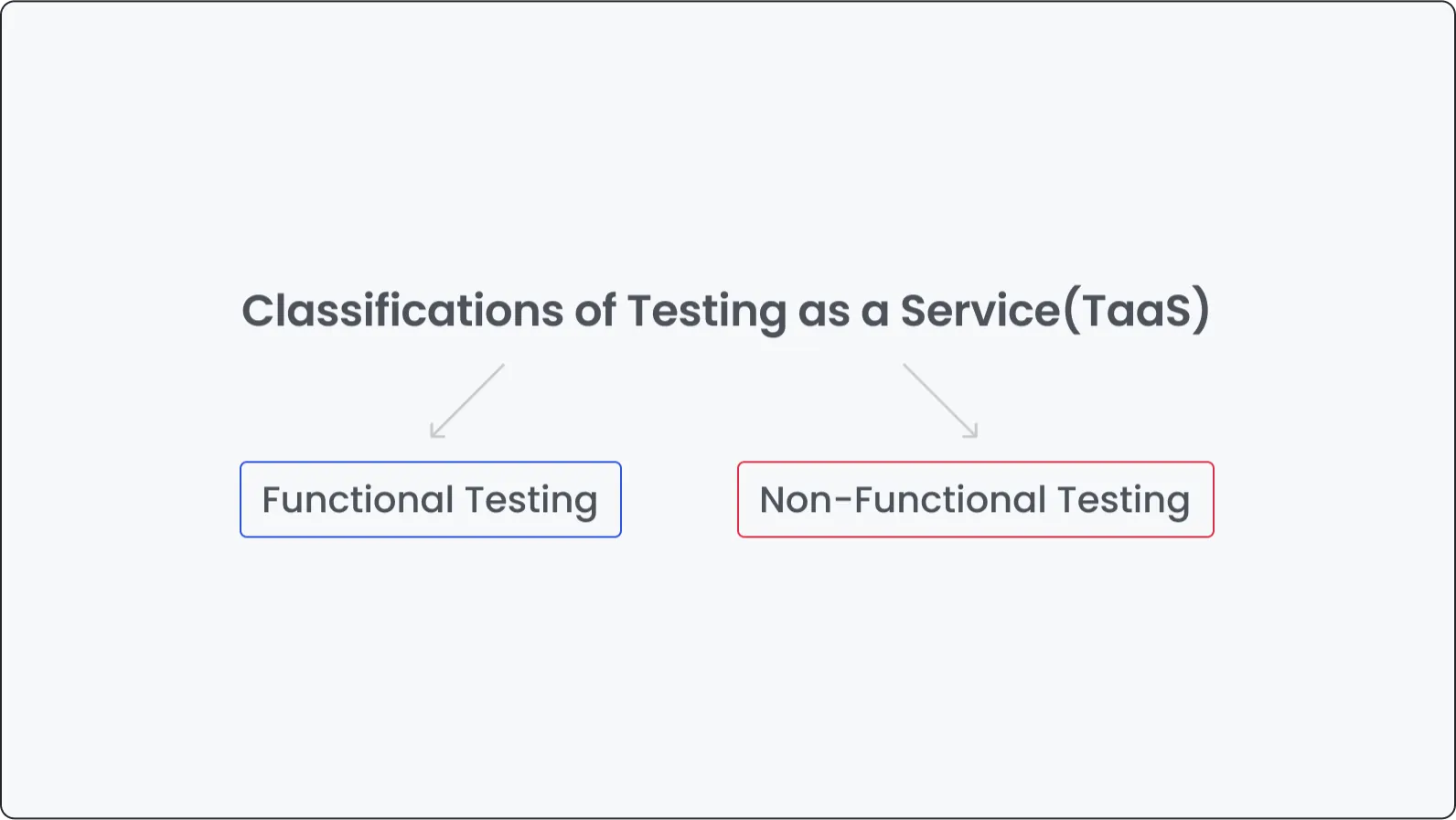11 minutes to read
What is testing as a service: What, why, and when to Implement


Chief Executive Officer
When it comes to developing new software solutions, there's a perilous edge to cutting corners. We've all heard tales of software projects gone awry, where testing was sacrificed on the altar of tight deadlines and soaring ambitions. The consequences? Software glitches, security breaches, and customer frustration. The first example that pops up in our mind is probably the infamous "Mars Climate Orbiter".
In 1999, NASA's Mars Climate Orbiter mission ended in a fiery disaster. The spacecraft, designed to study the Martian climate, was lost in space. The reason? A simple oversight in the software code. Engineers failed to convert units from imperial to metric, a seemingly trivial error that resulted in the spacecraft burning up in the Martian atmosphere. It was a costly mistake (only the craft itself cost USD 125M+), both in terms of money and scientific progress.
The Mars Climate Orbiter saga serves as a stark reminder of the paramount importance of software testing — neglecting it can have catastrophic consequences. Yet, we don't have to rely solely on cautionary tales to understand the significance of TaaS. Real-world studies and experiments further underscore its importance. The National Institute of Standards and Technology (NIST) found that software bugs cost the U.S. economy an astonishing USD 59.5 billion annually. These figures are another stark reminder that the ramifications of inadequate testing reverberate far beyond the confines of a development team.
Understanding TaaS (Testing as a Service)
TaaS is an acronym for testing as a service, and it is always performed by an outside contractor. That is, you develop a certain software, and a subcontractor tests it. This way you save your own resources and, if the contractor is skillful enough, you also insure yourself against potential failures.
What is Testing as a Service?

Indeed, TaaS emerges as a pivotal player. But what is TaaS technology? As we said before, TaaS is a model where testing is outsourced to a specialized provider. It’s like having your own team of testing experts on call, without the hassle of hiring and managing an in-house QA team.
Most often this means you’ll have a range of testing services, including functional, performance, security, and compatibility testing. What makes it intriguing is its scalability. Whether you're a startup or an established enterprise, TaaS adapts to your needs. The benefits are clear: access to a broader spectrum of testing expertise, reduced overheads, and the flexibility to scale your testing efforts as your projects evolve.
Features of TaaS
Test Library: There is a special library called Test Library; it has lots of different tests and is very safe. You can change the settings to make it work for different situations. It also has a way to keep track of how much you use it and charge you accordingly.
Metering Capability: TaaS can track how much you use the service and charge you accordingly. This is a good way to save money because you only pay for what you use.
Community-Driven: The TaaS community is always adding new test cases to the library. This means that the library is always getting better, and you'll have more test cases to choose from. Sth like unlimited tea for English people.
On-Demand Availability: TaaS is available when you need it. You can set up test labs and run tests whenever you want. You don't have to invest in your own testing infrastructure.
Cloud Hardware Resource Pool: TaaS uses a cloud hardware resource pool. This means that you can share hardware with other TaaS users. This helps to save money and reduce waste.
Self-Service Portal: TaaS has a self-service portal where you can run your tests. This is easy to use and doesn't require any special training.
Short Turnaround: TaaS can run multiple tests at the same time. This means that you can get your results quickly.
Testing Cycle Support: TaaS vendors can help you plan, implement, and evaluate your software tests. This can save you time and money.
External Expertise: TaaS vendors can help you find the right technology solutions, design test cases, and manage your infrastructure. This can help you to improve the quality of your software.
Don't gamble on reputation. Mitigate risks with TaaS
Uttermost Importance: Testing in Software Development
Beyond the cautionary tale of the Mars Climate Orbiter, it's essential to underline that software defects can lead to costly consequences. A 2022 study conducted by the Consortium for IT Software Quality (CISQ) found that poor software quality cost U.S. businesses a staggering $2.41 trillion. These numbers reveal the magnitude of the challenge, but they also illuminate the opportunity.
Effective testing is about safeguarding your organization’s reputation, ensuring data security, and enhancing user experience. By investing in rigorous testing, you mitigate the risk of post-release software woes and, ultimately, save time and resources.
When to use TaaS?
In which cases opt-in test service isn’t a matter of your company size as it's driven by the nature of your projects. TaaS can become the apple of your eye in various scenarios:
1. High-volume Testing: When your projects involve large-scale applications or frequent software updates, TaaS can efficiently handle the influx of testing demands.
2. Specialized Testing: For industries with unique testing requirements, such as healthcare, finance, or gaming, TaaS providers with domain-specific expertise can offer invaluable insights.
3. Resource Constraints: If you're operating with limited resources or facing tight deadlines, TaaS can help you maintain testing quality without stretching your internal team too thin.
Traditional vs. TaaS Services
When it comes to software testing, choices abound. Two prominent players in the field are traditional in-house testing and software testing as a service. To help you navigate this decision, let's compare these approaches in a head-to-head showdown. Below, we present a comparative table highlighting the key differences between Traditional Testing and TaaS Services. Whether you're a startup, an established corporation, or something in between, this table could be your compass.

Types of Testing Offered Through TaaS
When you embark on the journey of test service, you gain access to a diverse array of testing types that cater to the intricate landscape of software development. In general, there are two broad groups of tests: functional and non-functional. It’s possible you can find another ramification, but we go further with this one as more clear-cut.

Functional Testing in TaaS
Functional testing forms the bedrock of software evaluation. TaaS extends this fundamental practice with a suite of testing types:
Unit Testing: At the foundational level, Unit Testing scrutinizes individual components or units of your software. It ensures that each part functions correctly in isolation, identifying any code-level defects. Think of this as checking the vital signs of individual parts of your software. It ensures that each piece works correctly on its own, making sure there are no code-level hiccups.
Integration Testing: As your software becomes more complex, Integration Testing checks how different parts work together. It's like ensuring that a puzzle's pieces fit snugly.
System Testing: This one examines the entire software system, making sure that everything plays well together. It's like the final dress rehearsal before a big performance.
Acceptance Testing: The ultimate litmus test, Acceptance Testing, ensures that your software aligns with user expectations. It assesses whether the software meets the acceptance criteria, validating its readiness for deployment.
Non-functional Testing in TaaS
From the text above, it might seem that functional tests are more important than others. After all, they check the software capability. And such tests are indeed important, but not more important than non-functional ones. TaaS offers an array of non-functional testing types to address these vital considerations:
Security Testing: Just recall a recent Okta breach to understand how security is important. TaaS providers rigorously assess your software's vulnerabilities, identifying and mitigating security risks.
Performance Testing: To ensure that your software can handle the stress of real-world usage, Performance Testing evaluates its responsiveness, scalability, and stability under different conditions.
Usability Testing: The user experience is the star here. Usability Testing ensures your software is user-friendly, making sure it's a pleasure (or, let’s face it, even addiction) to use.
Compatibility Testing: In the diverse world of devices and browsers, Compatibility Testing ensures that your software functions seamlessly across platforms, making it accessible to a wider audience.
How Does Testing as a Service Work?
Every business owner, CTO, or other C-suite representative wants to make informed decisions in their software development journey. So before calling on TaaS testing, let’s explore its models, shedding light on how this service operates and its various approaches.
Models of TaaS
On-Demand TaaS
What’s it: On-demand TaaS is like having a testing genie at your beck and call. You can summon testing services as needed, without the long-term commitment. This model offers the flexibility to scale up or down, depending on your project's demands.
Benefits: The freedom to access testing services when and where you need them is the crown jewel of on-demand TaaS. It keeps your testing costs in check while ensuring the quality of your software. The pay-as-you-go structure ensures that you're only paying for what you use, avoiding unnecessary overheads.
Use cases: On-demand TaaS is the go-to choice for startups with fluctuating testing needs, businesses dealing with short-term projects, and those seeking a cost-effective solution without compromising quality.
Managed TaaS
What’s it: It’s like having an entire QA department at your disposal without the management headache. In this model, you have a dedicated team of testing experts working seamlessly with your in-house team. They become an extension of your workforce, offering a long-term partnership.
Benefits: The Managed TaaS model ensures that your software's quality is consistently maintained. You have access to a pool of expertise, and there's no need for recruitment, training, or HR hassles. This approach guarantees testing excellence without the complications of managing a dedicated QA team.
Use cases: Managed TaaS is the preferred choice for enterprises with ongoing testing needs, businesses with complex projects requiring continuous testing, and organizations looking for a long-term testing partnership to ensure software quality.
Hybrid TaaS
What’s it: As you probably guessed, it is like the best of both worlds. It combines the flexibility of on-demand TaaS with the reliability of managed TaaS. This model allows you to choose when to leverage external testing resources and when to rely on your in-house team. It's adaptable and tailored to your project's evolving needs.
Benefits: The Hybrid TaaS model is all about the agility to optimize your testing resources. It allows you to respond to changing project requirements, ensuring that you have the right balance between in-house and external testing expertise.
Use cases: Hybrid TaaS is an excellent choice for organizations with dynamic testing requirements, seasonal fluctuations in project demands, or businesses seeking a custom-tailored testing approach that adapts to changing circumstances.
Considerations When Implementing TaaS
When should you consider implementing software testing as a service in your workflow? The answer lies in understanding the unique circumstances where TaaS shines. Just look over the following points before implementing.
Fluctuating Workloads: If your project demands vary over time, TaaS provides the flexibility to scale your testing resources up or down as needed. For example, e-commerce platforms often experience seasonal spikes in traffic, making TaaS an ideal choice to handle peak testing loads. Excluding probably only Amazon and Etsy, almost all modern marketplaces optimize their testing costs through testing outsourcing.
Access to Specialized Expertise: TaaS brings a sea of domain-specific expertise. When your project requires specialized testing skills, such as compliance testing in healthcare or security testing in finance, TaaS providers can offer the needed proficiency.
Cost Efficiency: For startups and small businesses, keeping testing costs manageable is crucial. TaaS allows you to access professional testing without the overhead costs of maintaining an in-house team. It's a budget-friendly choice.
Short-term Projects: When you have short-term or one-off projects, TaaS is a nimble solution. You can engage testing experts for the project's duration without the need for long-term commitments.
Imagine the conditional case of a mobile gaming company preparing for the launch of a new game. They don’t start an aggressive marketing campaign and anticipate the buzz to subside after a few months. TaaS allows them to secure a robust testing strategy during the peak launch period and then scale down the testing resources once the game stabilizes.
To Sum It Up
Testing as a Service (TaaS) is not merely a choice; it's a strategic imperative. TaaS offers the flexibility, expertise, and efficiency needed to navigate the complexities of modern software development. By embracing TaaS, you unlock the power of on-demand testing, tapping into specialized expertise, and optimizing your testing resources.
As we stated before, poor software quality directly impacts reputation and revenue: on average, U.S. companies lose over USD 59 billion due to it. TaaS, on the contrary, stands as a beacon of reliability. It's the ally you need to safeguard against software glitches, security breaches, and user dissatisfaction. With TaaS, your software development journey becomes more agile, cost-effective, and quality-driven.
Team up with an award-winning software QA and testing company
Trusted by 300+ clients worldwide
